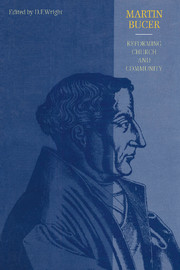Book contents
- Frontmatter
- Contents
- Notes on contributors
- List of abbreviations
- Introduction
- 1 Martin Bucer and the Old Church
- 2 The relation between church and civil community in Bucer's reforming work
- 3 Bucer's influence on Calvin: church and community
- 4 The church in Bucer's commentaries on the Epistle to the Ephesians
- 5 Church, communion and community in Bucer's commentary on the Gospel of John
- 6 Eucharistic communion: impulses and directions in Martin Bucer's thought
- 7 Martin Bucer and the ministry of the church
- 8 Infant baptism and the Christian community in Bucer
- 9 Bucer's ecclesiology in the colloquies with the Catholics, 1540–41
- 10 The Strasbourg Kirchenpfleger and parish discipline: theory and practice
- 11 Ecclesiological motifs behind the creation of the ‘Christlichen Gemeinschaften’
- 12 Martin Bucer in England
- 13 Martin Bucer and the Englishing of the Psalms: pseudonymity in the service of early English Protestant piety
- Bibliography
- Biblical index
- Index of Bucer's works
- Index of modern authors
- General index
Introduction
Published online by Cambridge University Press: 22 September 2009
- Frontmatter
- Contents
- Notes on contributors
- List of abbreviations
- Introduction
- 1 Martin Bucer and the Old Church
- 2 The relation between church and civil community in Bucer's reforming work
- 3 Bucer's influence on Calvin: church and community
- 4 The church in Bucer's commentaries on the Epistle to the Ephesians
- 5 Church, communion and community in Bucer's commentary on the Gospel of John
- 6 Eucharistic communion: impulses and directions in Martin Bucer's thought
- 7 Martin Bucer and the ministry of the church
- 8 Infant baptism and the Christian community in Bucer
- 9 Bucer's ecclesiology in the colloquies with the Catholics, 1540–41
- 10 The Strasbourg Kirchenpfleger and parish discipline: theory and practice
- 11 Ecclesiological motifs behind the creation of the ‘Christlichen Gemeinschaften’
- 12 Martin Bucer in England
- 13 Martin Bucer and the Englishing of the Psalms: pseudonymity in the service of early English Protestant piety
- Bibliography
- Biblical index
- Index of Bucer's works
- Index of modern authors
- General index
Summary
Martin Bucer has not always been given his due in the country where he spent the last years of his life. Two editions of The Oxford Dictionary of the Christian Church have carried an article on him which fails to mention Strasbourg, where he worked for a quarter of a century – virtually his entire career as a Reformer. A generation of Anglicans decreasingly appreciative of Thomas Cranmer's legacy is unlikely to be well informed about Bucer's contribution to the revised Book of Common Prayer of 1552. Too few English church historians are aware that the most comprehensive blueprint for a Christian society produced anywhere in the sixteenth-century Reformation – not excepting Calvin's Geneva – was Bucer's The Kingdom of Christ, a late New Year gift for Edward VI in 1550.
So it is gratifying to record that on 12 November 1991, a service in Great St Mary's, Cambridge, marked the quincentenary of the birth (on St Martin's Day, 11 November 1491) of Martin Bucer, one of the University's earliest Regius Professors of Divinity. And it is appropriate that Cambridge University Press, whose productive history stretches back a couple of decades before Bucer's Cambridge years, should publish a commemorative set of essays on the most distinguished continental Reformer to cross the Channel.
- Type
- Chapter
- Information
- Martin BucerReforming Church and Community, pp. 1 - 4Publisher: Cambridge University PressPrint publication year: 1994
- 5
- Cited by



